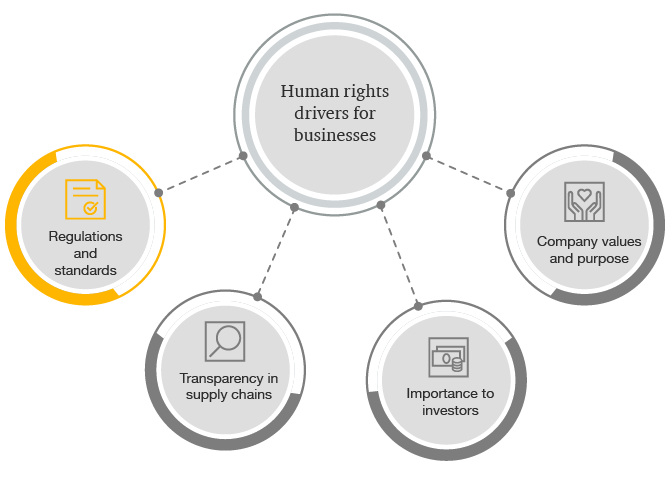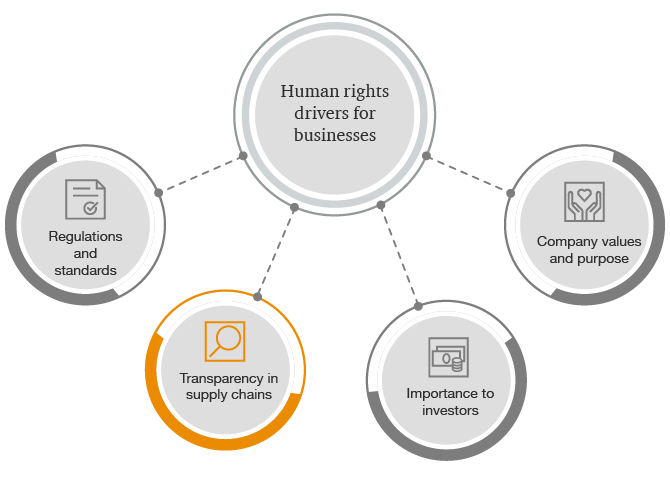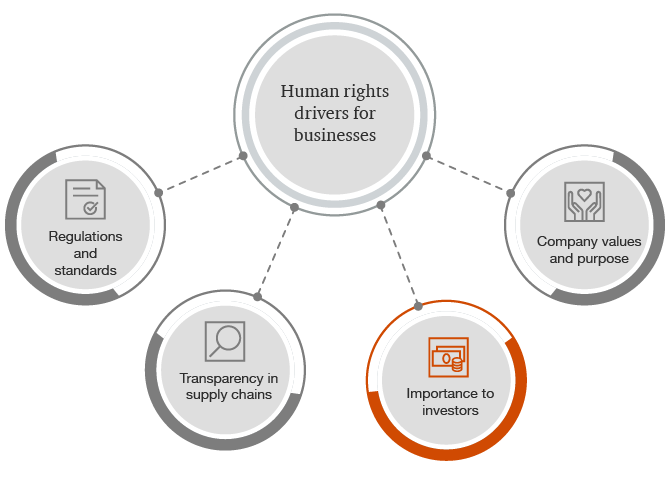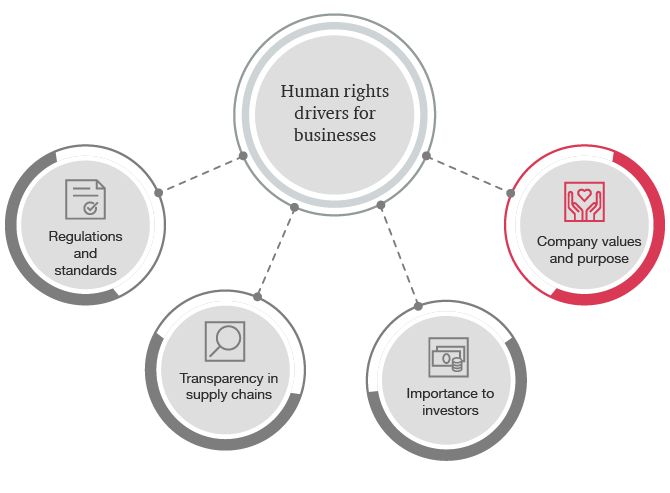
From regulation to implementation and strategy
In an increasingly interconnected world, companies are facing heightened scrutiny over their sustainability performance, formally from regulators and informally from their stakeholders. One critical aspect of that is the upholding of human rights throughout the value chain. Respect for human rights is not just a moral obligation. It has recently become a regulatory obligation in many EU and non-EU countries and will be a strategic imperative that can foster long-term success and resilience.


Recognise impact, take action
Every industry and even every company can pose risks to people by negatively impacting human rights. Examples include forced labour and human trafficking in upstream supply chains, violation of privacy and digital rights of customers and users, impacts on land rights or access to basic services, water and sanitation for communities living close to large industrial or extractive sites. The risks may differ per sector or per portion of the chain, requiring companies to conduct specific and tailored assessments on a regular basis. Broadly speaking, companies relying on a wide range of raw materials and ingredients tend to have severe human rights impacts in the upstream portion of their supply chains - that is, with their suppliers, subcontractors and other business partners.
Companies providing services to individuals such as technology, education or financial services need to focus on the downstream portion of the chain as well – issues such as children's rights online or gender-based discrimination in access to services are likely to be relevant. Regardless of the human right impacted, companies must recognise and use the influence they have on their value chains in order to preserve the rights of individuals and communities.
Four reasons for being proactive in addressing negative human rights impacts


Regulations and standards
Legislation related to human rights and the social impact of companies is growing. Regulations such as the CSRD contain various disclosure standards (ESRSs) with requirements grounded in human rights law and practice. These standards ask companies to be clear on their impact on their own employees, workers in the value chain, communities and consumers and end users. The EU taxonomy includes the obligation for organisations to conduct human rights due diligence in line with the OECD Guidelines for Multinational Enterprises and the United Nations Guiding Principles on Business & Human Rights to claim taxonomy alignment.
The recently adopted Corporate Sustainability Due Diligence Directive (CSDDD) mandates implementation of human rights and environmental due diligence following the same OECD and United Nations standards. The final addition to the list, the EU Forced Labour Regulation, introduces a ban on the import and sales of products made with forced or child labour.


Transparency in supply chains
Building transparency in supply chains is imperative for companies. It helps to minimise the risks of disruptions at a time of large-scale regulatory changes and against the backdrop of geopolitical tensions.
Building transparency is also needed to comply with CSDDD and the EU Forced Labour Regulation. Social audits and site inspections for tier-1 suppliers are not enough and have been heavily criticised for being a one-direction approach that does not help suppliers effectively identify and address actual and potential human rights impacts. One of the ways to achieve transparency will be through training and upskilling of all actors along the value chain empowering them to take business decisions that align with human rights standards.

Importance to investors
Missteps in the past have impacted companies through reputational damage, adverse market reactions and loss of investors. As the S of ESG comes into focus more, companies are increasingly being held accountable for their impact, especially by investors and financial institutions. There is a growing number of companies that have credit terms dependent on their ESG performance. Ratings agencies also include human rights performance alongside other ESG metrics in their evaluation of companies. Assessments are increasingly sophisticated and go far beyond checking whether a company has a human rights policy on paper or a link to a grievance mechanism on their website.
Going forward, companies disclosing their human rights approach will likely see greater access to and reduced cost of capital. This shift will be partially linked to the ability of human rights-minded business to access more business opportunities: an example is robust human rights due diligence becoming an integral part of the criteria to participate in public tenders.

Company values and purpose
Because of stakeholders’ expectations and pressure, organisations have begun to think about their reasons to exist and operate. What does our organisation add to society? What is our position now and in the future? How do we maintain and increase our ‘licence to operate'? These crucial questions are asked in boardrooms, and across corporate departments ranging from HR to risk management and from product design to customer service. The answers are not only about economic value, but also about creating social value for a broad group of stakeholders, including employees, customers and local communities. A credible purpose must be backed up by actions and decisions. Violating human rights does not fit into that.
Related content


Human rights requirements build on a shared foundation
Regulations should encourage companies to strengthen their control of human rights. But that goes further than drawing up policy, says Anna Bulzomi.

Living wage: a social investment
CSRD provides organisations an opportunity to actually budget for the impact in their own organisation and their value chain, argues PwC expert Bas van de Pas.

Corporate Sustainability Reporting Directive
The new EU directive CSRD - reporting of non-financial information - will take effect as of fiscal year 2024. Who, what, when and how? Read all about the CSRD...





Contact us













